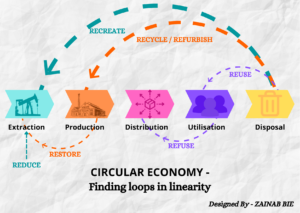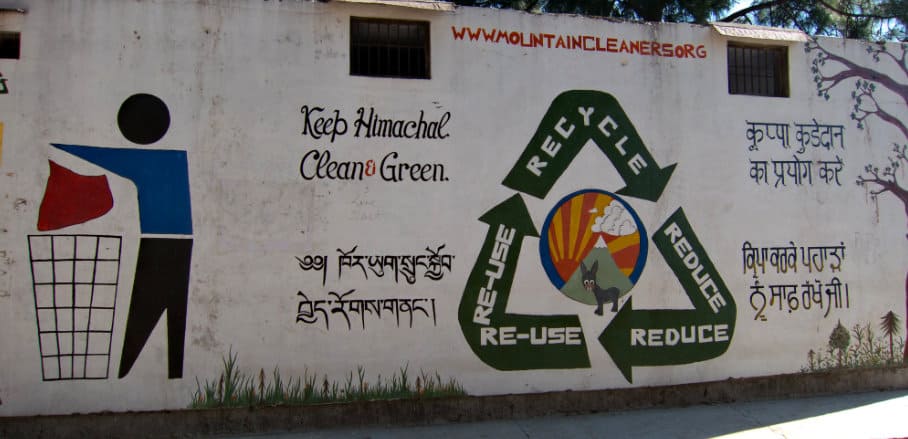GDP, GDP Everywhere, Welfare on the Brink!
In order for the coming generation to have a future, governments, corporations, and individuals should focus less on economic growth and more on creating a sustainable system Zainab Bie argues.
Economics, the science of how scarce resources are allocated, is at the core of our most challenging environmental concerns, and therefore essential. Although conventional economic growth has assisted in raising global living standards, it has also generated massive environmental degradation, waste, diseases, and poverty. In a world of increasing scarcity and competing demands, economic analysis can drive public policy to efficient utilisation of resources.
A different, sustainable system might make it easier to stop climate change and other types of environmental damage. Economics, when combined with other social and behavioural sciences, becomes crucial for exploring the possible shift of human behaviour toward achieving sustainable development. In order to always put people and the planet before profits, we need to redefine business models and our economic systems where all efforts must be co-created, co-led, and co-owned with or by people.
Resource efficiency means using the earth’s limited resources sustainably while minimising impacts on the environment; and once resource efficiency measures are put in place, then a circular economy can be systematised. A circular economy is a model of production and consumption, which involves sharing, lending, reducing, repairing, refurbishing, reusing, and recycling existing materials and products as long as possible before disposing of them. In this way, value chains and the life cycle of products and materials are extended, thereby reducing waste and conserving resources.
The current linear model of the economy, take-make-waste, is unsustainable. Therefore, a shift from linearity to circularity where there only is very little waste is essential. Products need to be designed to last a long time and can be reused, repaired, and refurbished. Consumption does not cease, instead becomes more sustainable.
To Live Sustainably is Our Responsibility
It is clear that our economy needs to change. So it is not only time for individuals but especially for governments and companies to align their entire framework with the circular economy framework as it is essential to have a brighter, healthier, and green future.
While sustainability was formerly only associated with the environmental impact, now, I feel that it has a broader approach focusing on social and economic issues as well.
While sustainability once meant taking cloth bags for shopping, choosing public transport rather than driving to work, and planting more trees, it requires this and more, to be truly sustainable!
Think about investing in companies transitioning to sustainable practices, opting in for opportunities where we are reducing the waste in some way or the other, supporting reusable packaging for brands, and calling for the biggest corporate polluters to do better. There is no way we can sustain life without having a healthy environment. And we need healthy and sustaining economies to eradicate poverty and achieve the United Nations Sustainable Development Goals (SDGs). In our current take-make-waste society, often these goals seem to conflict with each other, and our economic pursuits disrupt too closely on nature.
But we need to realise the fact that nature—a stable climate, reliable resources like water, forests, and other natural resources—is what makes economic growth possible. We can`t choose between nature and economic growth. There is no long-term human development possible without a healthy natural world.
In these times of shared crisis, everyone has a responsibility to act. Ultimately, what happens to our future generations depends on the ambition and urgency with which leaders collaborate to address global problems like poverty, climate emergency, and inequality today.

There is Hope!
Today’s young people and activists serve as reminders of just how capable human beings can be in re-making the world.
The private sector can end helping or incentivising industries and activities that damage the planet and instead invest in sustainable development. Governments can come up with effective policies to fight climate change and the destruction of nature. Change must begin now, and it must encompass us all! With its inequalities in sharp focus as the Covid-19 pandemic and its socio-economic impact continues to extend unresolved challenges, the world stands at a critical point. Global leaders are now challenged with deciding whether the new normal will focus on the resumption of production as usual or a redefined collaborative mission that translates the hopes and aspirations of the individuals around the world into new and lasting prosperity for all. Nature is resilient. We can still reverse some of the damage we have done to this planet. However, the clock is ticking now. If we delay, the damage will exceed irreversible tipping points. Therefore, the pandemic recovery truly is an opportunity to transform our economic regime with more comprehensive consideration. We have a once-in-a-lifetime opportunity to reimagine the world as it can be, not just as it is. We must work collaboratively, on several fronts, and we must do it now! I believe that we are the youth, and we are the future of tomorrow and without us, there is no moving forward. It is high time now that we take charge of society and work towards its betterment for there is no future possible except a sustainable one.
- GDP, GDP Everywhere, Welfare on the Brink! - 9. August 2022
